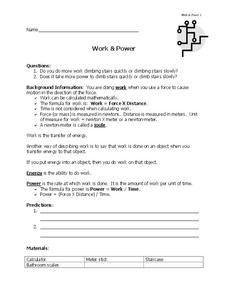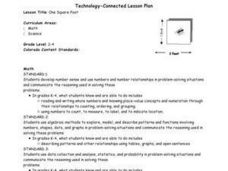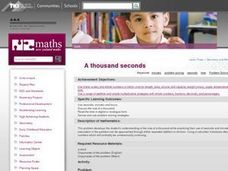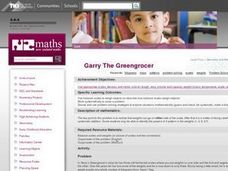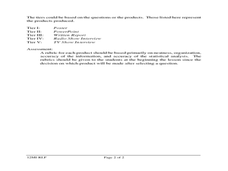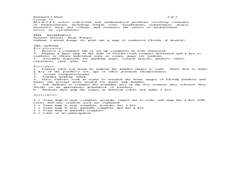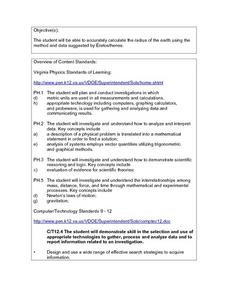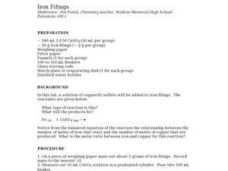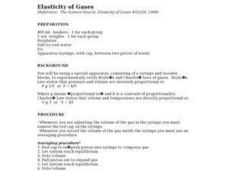Curated OER
Paper Packaging Design
Learners discuss the relationship between technology and manufacturing. They then use their ideas to construct a model of a paper board carton package. Next they view a PowerPoint presentation to learn about the history of packaging...
Curated OER
Work and Power
Students investigate work and power. In this energy lesson, students use the scientific method process to explore how much work and power it takes for a person to climb a stair case.
Curated OER
One Square Foot
Students identify, describe, count, tally, and graph life found in one square foot of land.
Curated OER
How Cool Is Your Environment?
Students study the formulas for calculating heat energy and how to convert Celsius to Fahrenheit. They apply the formulas on a worksheet.
Curated OER
Houses
Third graders use a number of problem solving strategies in this unit of lessons. They determine how to draw and model three-dimensional objects, use co-ordinate systems, determine probability of events, and identify paths of simple...
Curated OER
Perimeters, Patterns, and Conjectures
Learners discover patterns and write conjectures relating to perimeters and polygons. Working in cooperative learning groups, they use manipulatives and graphic organizers to solve problems then answer a series of questions in which they...
Curated OER
Worms and more
Students have early length experiences must develop an awareness of what length is, and of the range of words that can be used to discuss length. Young children usually begin by describing the size of objects as big and small. They...
Curated OER
WHY DO SOME THINGS FLOAT WHILE OTHERS SINK
Students explore how density can cause things to sink or float by experimenting with a jar, oil and corn syrup.
Curated OER
Prints and Outlines
Students determine the area of two objects by superimposing one on the other. They compare and order the area of different shapes by covering a larger shape with similar smaller ones. They complete these activities as different stations.
Curated OER
Visiting Grandma
First graders investigate the aspect of time, including days of the week using a calendar. They use problem solving strategies and a monthly calendar to find a solution to the problem.
Curated OER
A thousand seconds
Students use seconds, minutes, and hours. They then discuss the size of a thousand. After that they read time in digital or analogue form.
Curated OER
Parking Meters
Third graders are introduced to the problem with a short discussion about parking. They then solve with a partner. As they work ask questions that focus on the strategies they are using to make the calculations.
Curated OER
Garry The Greengrocer
Fourth graders are introduced to the problem by weighing objects on the balance scales. Use weights in both pans. (If you don't have access to scales use 2 containers and a child acting as the balance.) They then listen to the problem...
Curated OER
Adam's Watch
Third graders use their watches to tell the time while the teacher lists their responses on the board along with the reasons for them (set incorrectly, gain/lose time). They solve the problem in pairs and focus their thinking on the...
Curated OER
Data Analysis
Young scholars examine techniques to represent data. In this data analysis lesson, students read about various ways to represent data, such as a stem and leaf diagram and calculating standard deviation. Young scholars complete data...
Curated OER
Home on the Range
Students use maps and mathematics to determine the appropriate panther population in a given area. In this Florida ecology lesson, students research the area requirements of male and female panther and use a map to help calculate how...
Pennsylvania Department of Education
Seeing Doubles
Students work with dominoes to recognize the number of spots on each side as they relate to addition facts. In this seeing doubles lesson, students make triangle shaped flash cards for the double facts. Students represent the correct...
Curated OER
Looking into Eratosthenes' Radius of the Earth
Young scholars, in small groups, research Eratosthenes and his calculations of the Earth's radius. They write a summary of the person, the experiments and his calculations to determine how accurate Eratosthenes was in his estimations of...
Curated OER
Food Energy
In this food energy learning exercise, students review calories and how calories are determined. Students calculate how much thermal energy it would take to raise certain volumes of water a certain number of degrees. This learning...
Teach Engineering
Concentrate This! Sugar or Salt...
Heat up your lessons on boiling points. The resource provides a three-part activity: first, groups find the boiling point of solutions; second, they create boiling point curves for salt and sugar solutions; and third, they mix a solution...
Teach Engineering
What a Drag!
Stop and drop what is in your hand! Pupils investigate how form effects drag in the 12th part of a 22-part unit on aviation. Groups create equally weighted objects and determine which one falls the fastest by collecting data.
Curated OER
Iron Filings
Pupils conduct an experiment in which a solution of copper(II) sulfate is added to iron filings. They write and balance the equation for the reaction that occurs and calculate the amount of iron that reacted and the percent yield of...
Curated OER
Elasticity of Gases
Learners investigate gas laws and apply them in experimental conditions. Using an apparatus composed of a syringe and wooden blocks, they experimentally verify Boyle's and Charles' laws of gases.
Curated OER
Gravity (Newton's Laws of Motion): A Weighty Subject
Students identify Newton's Laws of Motion. They students explore Newton's Laws of Motion and apply the second law with a classroom activity. The videos will provide visual examples of the effects of gravity while riding on a roller coaster.



